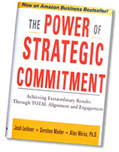
In our last blog post on this topic, we talked about the difference between a meeting that is organized around an agenda and one that is oriented around outcomes. In today’s post, we further explore this topic by looking at the impact each type of meeting has on team behavior.
The fundamental difference between an agenda-driven vs. a results-driven meeting is that they elicit two very distinct types of behaviors from team members.
When a meeting is oriented around topics and an agenda, it brings about a greater degree of opinion swapping. For example: Someone expresses his or her point of view on a new product, provoking someone else to state his or hers. That then reminds someone else of something tangential which they share, and soon these conversations begin to resemble a yo-yo.
But a meeting that is oriented around outcomes provokes conversations that focus people on saying something that has to do with achieving a result. It cuts back on the tangents and encourages team members to put forth offers, recommendations and commitments that move the action forward.
Some simple ways to make sure your meetings are result vs. agenda oriented include:
• Declare the meeting objectives at the beginning of the meeting, rather than by the amount of time allocated to each topic. Encourage spending as much time as needed on each item to achieve the stated objective(s) of the meeting.
• Invite people to the meeting who will gain from or contribute to the realization of the stated objectives of the meeting. Don’t invite spectators or people for political reasons.
• Complete the meeting by summarizing the commitments made, not the topics discussed. Too often, the minutes of a meeting reflect what was talked about, not the promises made.
• Don’t tolerate conversations that don’t directly forward the outcomes you want to achieve.
By focusing on these guidelines, your next off-site or team meeting can go from drowning in conversation to being infused with commitment.
How do you make your meetings effective? We would love to hear your comments.

